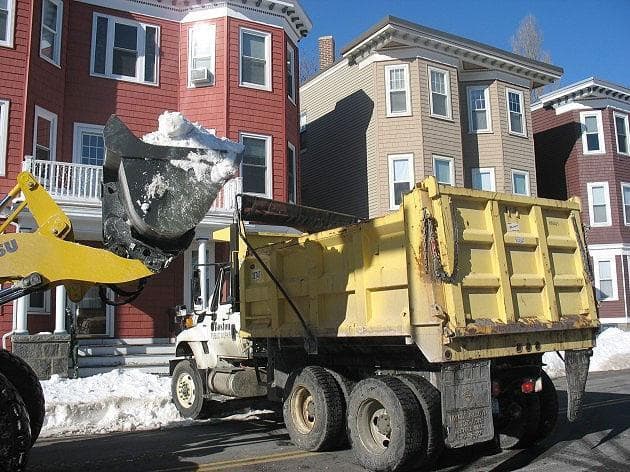Advertisement
After Snow Dump, Authorities Try To Dump The Snow
Resume
After 48 hours of snow, sleet, rain and ice, many Boston residents are fed up with winter weather.
Before the mammoth storm hit this week, Boston Public Works crews frantically tried to get as much of the old snow off the streets as possible. On L Street in South Boston, a front-end loader scooped it into a dump truck and then drove it to what the city calls a "snow farm."
State and federal environmental laws prevent dumping the snow in rivers, wetlands and the ocean. Ed Coletta, the spokesman for the Massachusetts Department of Environmental Protection (DEP), says the piles are full of contaminants.
"Obviously you have sand and salt that are used on the roadways," Coletta said. "(In) the snow you have debris, perhaps shopping carts in places like East Boston and the city of Boston, you have parking savers that sometimes get swept up into the snow. You don’t want that kind of debris being put into the harbor or being put into waterways."
Add to that a little motor oil, windshield wiper fluid, some dog poop and you have a toxic mound of snow.
Almost every city or town has a snow storage area, either in a vacant lot or a field. In Brookline, it’s called a "snow dump" and Public Works Commissioner Andrew Pappastergion said it’s almost full already.
"These are unusual circumstances," Pappastergion said. "And we’re not half-way through the winter, so the potential for getting over 100 inches of snow here is quite real. So quite frankly, what are you going to do with all that snow? It’s a real public safety issue that we’ve got to get it up off certain streets — we just don’t have the room."
That’s the tension: keeping streets clear enough for fire trucks and keeping our water safe. In the Boston area, residents get their drinking water from the Quabbin Reservoir, but elsewhere, people use private wells.
"There’s a lot of people in the state that rely on groundwater aquifers for their water supply and they can be impacted by salt and roadway runoff," said Kate Bowditch, who works with the Charles River Watershed Association.
Bowditch says even though she’s a skier and loves a snowy winter, as an environmentalist, she’s concerned about how we manage snow and store it because it will eventually all end up in the same place.
"The main reason I think the winter runoff is such a problem is that it tends to come in these big slugs," Bowditch said. "The snow accumulates, you have a lot of water and a lot stuff being stored there, and when it melts it just gushes out into the streams and rivers."
It used to be you could truck the snow to the Boston Harbor and dump it in. Now that’s illegal. But the high volume of snow this year has more people asking for exemptions from the environmental rules.
So far, the DEP has granted two waivers, one to Massport to push the snow off the runways into the Harbor and one to the U.S. Coast Guard in the North End. If we don’t get a lot of melting soon, the DEP says more could seek an exemption.
But for environmentalists and storm-weary Bostonians alike, there’s good news! On Groundhog Day Punxsutawney Phil didn’t see his shadow, so spring is coming early.
This program aired on February 3, 2011.